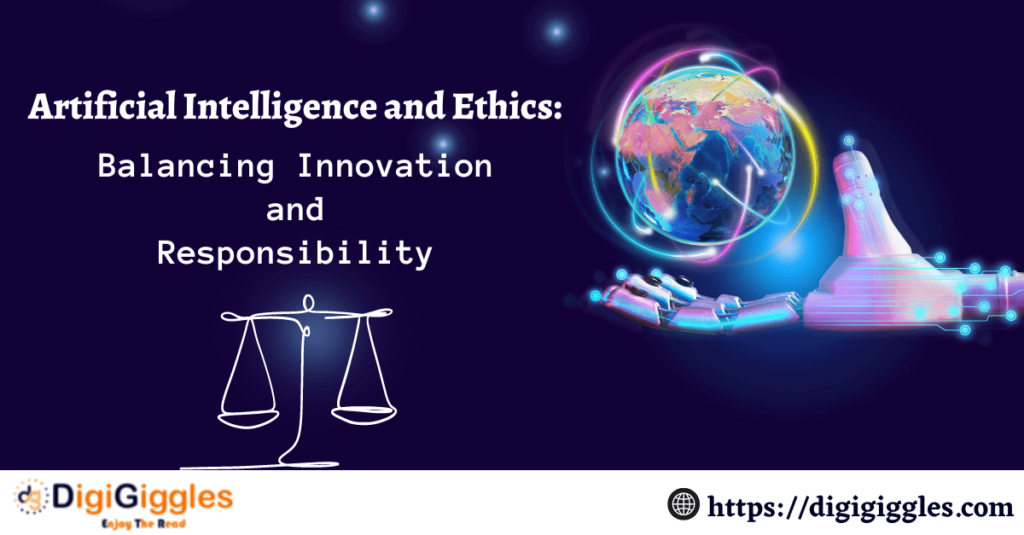Introduction:
Artificial Intelligence (AI) has emerged as a transformative technology with the potential to revolutionize various aspects of our lives. From healthcare and transportation to finance and entertainment, AI systems are increasingly being integrated into everyday processes. While AI offers tremendous opportunities for innovation and advancement, it also raises profound ethical concerns. This blog will explore the delicate balance between AI innovation and ethical responsibility, highlighting the need for a proactive approach to ensure that AI technologies are developed and deployed with careful consideration of their impact on society.
The Rise of Artificial Intelligence:
Artificial Intelligence refers to the development of machines and computer systems capable of performing tasks that typically require human intelligence. Machine learning algorithms, neural networks, and deep learning techniques have enabled AI systems to analyze vast amounts of data, identify patterns, make predictions, and even exhibit autonomous decision-making. As AI capabilities continue to evolve, the ethical implications associated with their use become increasingly complex and significant.
Ethical Considerations in AI Development:
Privacy and Data Protection: AI systems rely on large datasets for training and optimization. Ensuring the privacy and security of personal data becomes crucial to prevent misuse or unauthorized access. Striking a balance between data collection for AI advancement and individual privacy rights is a pressing ethical concern.
Bias and Fairness: AI algorithms are trained on historical data, which may contain biases and reflect existing societal inequalities. If not addressed, these biases can perpetuate discrimination and reinforce social prejudices. Developers must actively work towards building fair and unbiased AI models to promote equity and inclusion.
Accountability and Transparency: As AI systems become more autonomous, it becomes challenging to determine who is responsible for their actions. Transparent algorithms and clear lines of accountability are necessary to mitigate potential harm caused by AI failures or unethical behavior.
Employment and Socioeconomic Impact: AI automation has the potential to disrupt industries and replace human workers. Ensuring a just transition and re-skilling programs for those affected by AI-driven job displacement is essential to mitigate socioeconomic inequalities.
The Need for Ethical AI Governance
To address the ethical challenges associated with AI, a robust framework for governance and regulation is necessary. This framework should involve various stakeholders, including policymakers, researchers, industry leaders, and civil society organizations. Key components of ethical AI governance include:
Legal and Regulatory Frameworks: Governments should establish clear guidelines and regulations to ensure responsible AI development, deployment, and use. These frameworks should address issues such as privacy, bias, accountability, and transparency.
Ethical Design Principles: AI developers should adopt ethical design principles that prioritize the well-being and interests of users and society as a whole. Incorporating multidisciplinary teams and diverse perspectives can help identify and address potential ethical concerns during the development process.
Continuous Monitoring and Auditing: Regular monitoring and auditing of AI systems are crucial to identify and rectify ethical issues that may arise over time. This process ensures that AI technologies remain aligned with ethical standards and societal expectations.
Public Engagement and Education: Engaging the public in discussions about AI ethics is vital to foster awareness and understanding. Public education initiatives can help dispel misconceptions, address fears, and ensure that the public has a voice in shaping AI policies and practices.
Conclusion:
Artificial Intelligence has the potential to revolutionize our world, but its development and deployment must be guided by ethical considerations. Striking a balance between innovation and responsibility is paramount to prevent the misuse of AI and safeguard the well-being of individuals and society. By fostering an ecosystem of ethical AI governance, we can harness the transformative power of AI while ensuring that it aligns with our collective values and respects fundamental human rights. As we navigate the intricate landscape of AI ethics, proactive measures and collaborative efforts will pave the way for a future where innovation and responsibility
